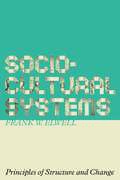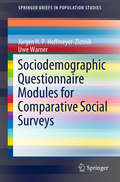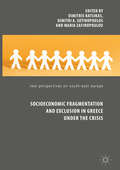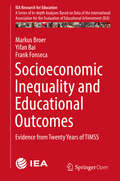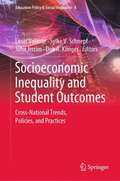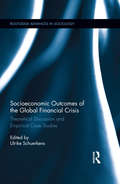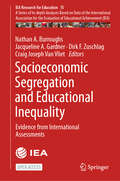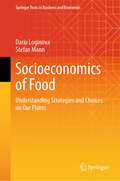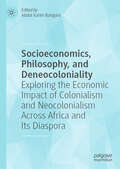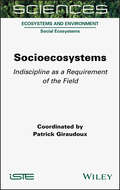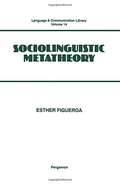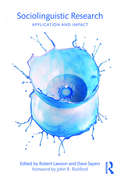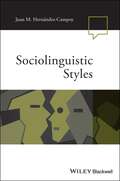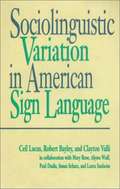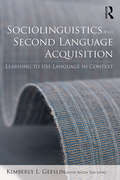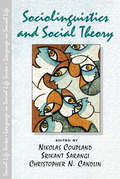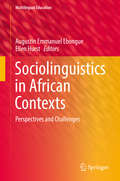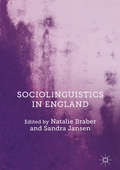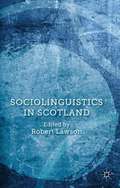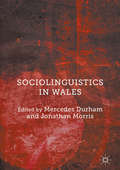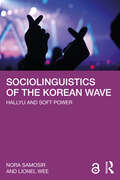- Table View
- List View
Sociocultural Systems: Principles of Structure and Change
by Frank W. ElwellMacrosociology—the study of large-scale social structures and the fundamental principles of social organization—was the style of sociology practiced by the founders of the discipline. Today, the social theories of Karl Marx, Max Weber, Émile Durkheim, and Herbert Spencer (among others) are commonly studied as part of the history of the field, but, although the macrosociological approach that these thinkers advocated is still employed, it no longer dominates the discipline. Instead, sociologists typically adopt a narrower focus, specializing in areas such as social psychology, medicine, religion, or the study of social stratification. Examining the bigger picture is a task often left to public intellectuals. Sociocultural Systems aims to reinstate macrosciology as the heart of the discipline by demonstrating that both classical and contemporary macrosociologists stand upon common ground. Focusing on the broad issues that concerned the founders, Elwell addresses questions such as: Historically, what factors accounted for the origin, survival, and evolution of sociocultural systems? Why were some societies more technologically advanced than others? What is the origin of capitalism? What factors determine the allocation of goods and services within and among societies? What effects do changes in government and economic institutions have on communities? Elwell argues that, as evolution does for biology, the macrosociological paradigm offers an analytical strategy that can be used both to guide and prioritize research in all of the myriad specialties within sociology and to lay forth an orderly body of knowledge for students. Clearly articulating important sociological principles, Sociocultural Systems provides a critical understanding of social institutions and issues, while also furnishing a framework for possible solutions to the perennial social crises that are part and parcel of the development of human societies.
Sociodemographic Questionnaire Modules for Comparative Social Surveys (SpringerBriefs in Population Studies)
by Uwe Warner Jürgen H.P. Hoffmeyer-ZlotnikAbove all, this book focuses on the application of sociodemographic survey questions. Based on theoretical foundations, it addresses the operationalization of variables and presents socio-demographic questionnaire modules for within- and across-country comparative survey research. The book pursues three main objectives: to provide a thorough and comprehensive overview of the survey instruments currently available for the measurement of sociodemographic variables in cross-national comparative research; to offer the reader a set of harmonized international demographic standards; and to show how these standards can be implemented by the various parties involved in international comparative surveys – from the central project coordinators, to the researchers on the national survey teams, to the fieldwork agencies and their interviewers, to respondents, and eventually, to the data processing experts preparing the datasets for comparative analysis. The book offers a valuable resource for researchers, practitioners and students actively involved in producing and analyzing sociodemographic survey data. The typical readers will be social science researchers, qualified consultants and professionals interested in the field of (comparative) survey research. The book can also serve as a useful supplement to introductory textbooks on survey methodology and is suitable for Bachelor and Master students of the social sciences.
Socioeconomic Fragmentation and Exclusion in Greece under the Crisis (New Perspectives on South-East Europe)
by Dimitris Katsikas Dimitri A. Sotiropoulos Maria ZafiropoulouThis volume uses new empirical evidence and analytical ideas to study phenomena of fragmentation and exclusion threatening stability and cohesion in Greek society in the aftermath of the crisis. The contributors argue that processes of fragmentation and exclusion provoked by the crisis can be observed on both a material and an ideational level. On a material level, rising levels of unemployment, poverty and inequality have produced new social security “outsiders”, while on an ideational level, a discursive-cultural shift is documented, which has led to new understandings and categorizations of new (and old) insiders and outsiders. Moreover, the volume attests to the aspirations, but also the limitations, of spontaneous civil society mobilization to address the social crisis. Finally, the volume offers a discussion of the political management of social fragmentation and exclusion in Greece both before and after the onset of the crisis. The book will be of interest to scholars and students of social policy and phenomena of poverty, social exclusion and economic inequality, civil society studies, and comparative political economy and politics.
Socioeconomic Inequality and Educational Outcomes: Evidence from Twenty Years of TIMSS (IEA Research for Education #5)
by Markus Broer Yifan Bai Frank FonsecaThis open access book focuses on trends in educational inequality using twenty years of grade 8 student data collected from 13 education systems by the IEA’s Trends in Mathematics and Science Study (TIMSS) between 1995 and 2015. While the overall positive association between family socioeconomic status (SES) and student achievement is well documented in the literature, the magnitude of this relationship is contingent on social contexts and is expected to vary by education system. Research on how such associations differ across societies and how the strength of these relationships has changed over time is limited. This study, therefore, addresses an important research and policy question by examining changes in the inequality of educational outcomes due to SES over this 20-year period, and also examines the extent to which the performance of students from disadvantaged backgrounds has improved over time in each education system. Education systems generally aim to narrow the achievement gap between low- and high-SES students and to improve the performance of disadvantaged students. However, the lack of quantifiable and comprehensible measures makes it difficult to assess and monitor the effect of such efforts. In this study, a novel measure of SES that is consistent across all TIMSS cycles allows students to be categorized into different socioeconomic groups. This measure of SES may also contribute to future research using TIMSS trend data. Readers will gain new insight into how educational inequality has changed in the education systems studied and how such change may relate to the more complex picture of macroeconomic changes in those societies.
Socioeconomic Inequality and Student Outcomes: Cross-National Trends, Policies, and Practices (Education Policy & Social Inequality #4)
by Louis Volante Sylke V. Schnepf John Jerrim Don A. KlingerThis book examines socioeconomic inequality and student outcomes across various Western industrialized nations and the varying success they have had in addressing achievement gaps in lower socioeconomic status student populations. It presents the national profiles of countries with notable achievement gaps within the respective school-aged student populations, explains the trajectory of achievement results in relation to both national and international large-scale assessment measures, and discusses how relevant education policies have evolved within their national contexts. Most importantly, the national profiles investigate the effectiveness of policy responses that have been adopted to close the achievement gap in lower socioeconomic status student populations. This book provides a cross-national analysis of policy approaches designed to address socioeconomic inequality.
Socioeconomic Outcomes of the Global Financial Crisis: Theoretical Discussion and Empirical Case Studies (Routledge Advances in Sociology)
by Ulrike SchuerkensThis book originates from a comparative research project involving extensive collection and analysis of primary and secondary materials (scholarly literature, statistical data, and interviews with key actors) on socioeconomic outcomes of the global financial crisis in all major world regions during the last years. Offering analytical and comparative insights at the global level, as well as an assessment of the overall social globalization phenomenon, this book will be useful for scholars, students, NGOs, and policy makers.
Socioeconomic Segregation and Educational Inequality: Evidence from International Assessments (IEA Research for Education #15)
by Nathan A. Burroughs Jacqueline A. Gardner Dirk F. Zuschlag Craig Joseph Van VlietThis open access book uses multiple IEA Assessments to examine the relationship between socioeconomic segregation between classrooms and student outcomes. By examining Socioeconomic status (SES) segregation between classrooms as well as between schools, it produces a more accurate estimate of student sorting. Further, this study examines the differential impact of student sorting across subject areas and grades in order to explore whether school structure’s relationship to educational inequality exhibits content and longitudinal heterogeneity. This study employs time series, fixed-effect, random-effects, and synthetic-cohort methods to comprehensively investigate the robustness of the relationship between SES segregation and achievement inequalities. This project makes an important contribution to researchers’ understanding of student sorting’s impact using a comparative lens, while also providing important information to policymakers on the role of schools in mediating social inequalities.
Socioeconomics of Food: Understanding Strategies and Choices on Our Plates (Springer Texts in Business and Economics)
by Stefan Mann Daria LoginovaThis textbook provides an introduction to the socioeconomics of food. Aimed mostly at students of economics and related social sciences, it explains how food markets function and what social and cultural factors influence the processes of food production and consumption. It also discusses the role of food producers, intermediaries, and consumers and examines the dynamics of prices, trade, and externalities.The book also highlights cultural and demographic processes and moral behaviors that shape production and consumption practices. Furthermore, it discusses issues of food quality, ethics, and politics. Readers are also introduced to food databases and methods of data processing.
Socioeconomics, Philosophy, and Deneocoloniality: Exploring the Economic Impact of Colonialism and Neocolonialism Across Africa and Its Diaspora
by Abdul Karim BanguraExisting paradigms such as &“decoloniality&” simplify the complex dynamics between former colonies and colonial powers. Such frameworks overlook the role of local elites in maintaining and even enhancing oppressive systems. They also imply that external forces are responsible for ongoing exploitation. This book tackles this concept head on by introducing a new methodology called &“deneocoloniality.&” Deoneocoloniality expands on decoloniality and neocolonialism. It argues that, while decoloniality focuses on the residual impacts of colonialism by external forces, it neglects the internal dynamics where former colonized elites play a significant role in perpetuating oppression for personal gain. The book presents socioeconomic and philosophical case studies to support deneocoloniality as a more comprehensive framework for understanding current realities in African countries. Readers will gain a nuanced understanding of the intricate power structures affecting developing nations. The book provides a structured methodology for analyzing problems, emphasizing the importance of logical reasoning and collaborative efforts. It offers practical solutions based on deep analysis, moving beyond mere diagnosis to actionable recommendations. This approach aims to equip readers with the tools needed to develop policies and strategies that address both external and internal sources of oppression.
Socioecosystems: Indiscipline as a Requirement of the Field
by Patrick GiraudouxThe idea of socioecosystems answers the growing need to understand, in the context of the Anthropocene, how adaptive processes interact, and how that interplay results in the coevolution of living beings. Studying socioecosystems means taking into account the diversity of temporal and physical scales in order to grasp how ecological, social and economic forces are interwoven. Based on these drivers, the complex dynamics that determine the habitability of the Earth emerge. This book analyzes, through concrete cases from regional socioecosystems on several continents, how research action has provided answers to problems related to agriculture, health and the conservation of biodiversity. It demonstrates that these undertakings could not have succeeded without the combined efforts of the communities of living beings and objects, the community of knowledge and the communities of action. These examples are accompanied by a reflection on the conditions that make it possible to bring this research to completion.
Sociolinguistic Fieldwork
by Natalie SchillingLooking for an easy-to-use, practical guide to conducting fieldwork in sociolinguistics? This invaluable textbook will give you the skills and knowledge required for carrying out research projects in 'the field', including: • How to select and enter a community • How to design a research sample • What recording equipment to choose and how to operate it • How to collect, store and manage data • How to interact effectively with participants and communities • What ethical issues you should be aware of. Carefully designed to be of maximum practical use to students and researchers in sociolinguistics, linguistic anthropology and related fields, the book is packed with useful features, including: • Helpful checklists for recording techniques and equipment specifications • Practical examples taken from classic sociolinguistic studies • Vivid passages in which students recount their own experiences of doing fieldwork in many different parts of the world
Sociolinguistic Metatheory (Language & Communication Library #14)
by Esther FigueroaLinguistics is a discipline with ever expanding boundaries and interests. Despite the narrow definition of linguistics which dominates academia, sub-fields continue to flourish and ways of doing linguistics continue to expand. As ways to do linguistics increase, and as approaches to linguistics accumulate over time, it becomes increasingly necessary for students of linguistics to have ways of understanding and comparing developments in linguistics. <p><p> Sociolinguistic Metatheory is a book which explains foundational developments in linguistics by taking the past three decades of developments in sociolinguistics and relating them to contemporaneous developments in received linguistics. Sociolinguistic Metatheory takes the reader through the basic philosophical questions which drive linguistic research. It looks in detail at three models of sociolinguistics - Dell Hymes and the Ethnography of Communication, William Labov and Sociolinguistic Realism, and John Gumperz and Interactional Sociolinguistics - and focuses on such questions as: Where is language located? How is an utterance-based approach to linguistics different from a sentence-based approach? How do metatheoretical paradigm assumptions such as realism or relativism affect the development of linguistic theory? What interesting developments in linguistic theory and analysis have sociolinguistics provided?
Sociolinguistic Research: Application and Impact
by Robert Lawson Dave SayersShortlisted for the LSA Leonard Bloomfield Book Award 2017 Sociolinguistic Research: Application and Impact provides a unique overview of international research projects, showcasing their positive outcomes and offering critical insights and constructive critiques into the meaning of ‘impact’ in contemporary research. The book includes: original findings from cutting-edge research from scholars such as Mary Bucholtz, Walt Wolfram and Peter Patrick; coverage of organisational contexts including education, government, justice, heritage, and the workplace; activities including after-school programmes, workplace training courses, social media campaigns, and video productions; application of research to professional practice including teaching (primary school to university), adjudication, police interviewing, and governmental policymaking; contributors’ personal reflections on the research process and its outcomes, including constructive critiques of institutional definitions of impact. With chapters spanning research across five continents, Sociolinguistic Research: Application and Impact is essential reading for sociolinguistic researchers, students embarking on sociolinguistic research, and anyone interested in the practical application of research on language and society.
Sociolinguistic Styles
by Juan Manuel Hernández-CampoySociolinguistic Styles presents a new and in-depth, historically rooted overview of the phenomenon of style-shifting in sociolinguistic variation. Written by an internationally acclaimed expert in the field, the text explores why, where and when it occurs. Full examination of the complex phenomenon of style-shifting in sociolinguistics, focusing on its nature and social motivations, as well as on the mechanisms for its usage and its effects In-depth, up-to-date critical overview of the different theoretical approaches accounting for stylistic variation, exploring their historical roots not only in sociolinguistics and stylistics or semiotics but also in classical fields such as rhetoric and oratory Coverage of a wide range of related concepts and issues, from the oldest Greek ethos and pathos or Roman elocutio and pronuntiatio to the contemporary enregisterment, stylisation, stance, or crossing Written by an academic who has been instrumental in developing theory in this area of sociolinguistics
Sociolinguistic Variation in American Sign Language
by Ceil Lucas Robert Bayley Clayton ValliThis volume provides a complete description of ASL variation. People from varying regions and backgrounds have different ways of saying the same thing. For example, in English some people say "test," while others say "tes'," dropping the final "t. " Noted scholars Ceil Lucas, Robert Bayley, and Clayton Valli led a team of exceptional researchers in applying techniques for analyzing spoken language variation to ASL. Their observations at the phonological, lexical, morphological, and syntactic levels demonstrate that ASL variation correlates with many of the same driving social factors of spoken languages, including age, socioeconomic class, gender, ethnic background, region, and sexual orientation. Internal constraints that mandate variant choices for spoken languages have been compared to ASL as well, with intriguing results.
Sociolinguistics
by Nikolas CouplandIn the first volume of this kind for years, the editors have assembled a definitive view of the discipline bringing together much original work in sociolinguistics, ranging from fundamental theoretical statements and methodological articles, to classic explorations in dialect and style variation, language attitudes and stereotyping, multilingualism, face-to-face interaction and ethnography of communication. The contributors are eminent sociolinguists acclaimed internationally as pioneers and leading authorities in the field. This major new textbook will be a unique and invaluable resource for students and teachers of sociolinguistics and neighbouring disciplines.
Sociolinguistics and Deaf Communities
by Ceil Lucas Adam C. SchembriHow do people use sign languages in different situations around the world? How are sign languages distributed globally? What happens when they come in contact with spoken and written languages? These and other questions are explored in this new introduction to the sociolinguistics of sign languages and deaf communities. An international team brings insights and data from a wide range of sign languages, from the USA, Canada, England, Spain, Brazil and Australia. Topics covered include multilingualism in the global deaf community, sociolinguistic variation and change in sign languages, bilingualism and language contact between signed and spoken languages, attitudes towards sign languages, sign language planning and policy, and sign language discourse. Sociolinguistics and Deaf Communities will be welcomed by students of sign language and interpreting, teachers of sign language, and students and academics working in linguistics.
Sociolinguistics and Second Language Acquisition: Learning to Use Language in Context (Second Language Acquisition Research Series)
by Kimberly L. Geeslin Avizia Yim LongSociolinguistics and Second Language Acquisition is a comprehensive textbook that bridges the gap between the fields of sociolinguistics and second language acquisition, exploring the variety of ways in which social context influences the acquisition of a second language. It reviews basic principles of sociolinguistics, provides a unified account of the multiple theoretical approaches to social factors in second languages, summarizes the growing body of empirical research, including examples of findings from a wide range of second languages, and discusses the application of sociolinguistics to the second language classroom. Written for an audience that extends beyond specialists in the field, complete with summary tables, additional readings, discussion questions, and application activities throughout, this volume will serve as the ideal textbook for advanced undergraduate or graduate students of second language acquisition and instruction, and will also be of interest to researchers in the fields of second language acquisition, second language instruction and sociolinguistics.
Sociolinguistics and Social Theory (Language In Social Life)
by Nikolas Coupland Srikant Sarangi Christopher N. CandlinThe empirical and descriptive strengths of sociolinguistics, developed over more than 40 years of research, have not been matched by an active engagement with theory. Yet, over this time, social theorising has taken important new turns, linked in many ways to linguistic and discursive concerns. Sociolinguistics and Social Theory is the first book to explore the interface between sociolinguistic analysis and modern social theory. The book sets out to reunite sociolinguistics with the concepts and perspectives of several of the most influential modern theorists of society and social action, including Bakhtin, Foucault, Habermas, Sacks, Goffman, Bourdieu and Giddens. In eleven newly commissioned chapters, leading sociolinguists reappraise the theoretical framing of their research, reaching out beyond conventional limits. The authors propose significant new orientations to key sociolinguistic themes, including- - social motivations for language variation and change- language, power and authority- language and ageing- language, race and class- language planningIn substantial introductory and concluding chapters, the editors and invited discussants reassess the boundaries of sociolinguistic theory and the priorities of sociolinguistic methods. Sociolinguistics and Social Theory encourages students and researchers of sociolinguistics to be more reflexively aware and critical of the social bases of their analyses and invites a reasessment of the place sociolinguistics occupies in the social sciences generally.
Sociolinguistics from the Periphery
by Helen Nikolas Coupland Sari Pietikäinen Kelly-Holmes Alexandra JaffeThis leading team of scholars presents a fascinating book about change: shifting political, economic and cultural conditions; ephemeral, sometimes even seasonal, multilingualism; and altered imaginaries for minority and indigenous languages and their users. The authors refer to this network of interlinked changes as the new conditions surrounding small languages (Sámi, Corsican, Irish and Welsh) in peripheral sites. Starting from the conviction that peripheral sites can and should inform the sociolinguistics of globalisation, the book explores how new modes of reflexivity, more transactional frames for authenticity, commodification of peripheral resources, and boundary-transgression with humour, all carry forward change. These types of change articulate a blurring of binary oppositions between centre and periphery, old and new, and standard and non-standard. Such research is particularly urgent in multilingual small language contexts, where different conceptualisations of language(s), boundaries, and speakers impact on individuals' social, cultural, and economic capital, and opportunities.
Sociolinguistics in African Contexts
by Augustin Emmanuel Ebongue Ellen HurstThis volume offers a new perspective on sociolinguistics in Africa. Eschewing the traditional approach which looks at the interaction between European and African languages in the wake of colonialism, this book turns its focus to the social dynamics of African languages and African societies. Divided into two sections, the book offers insight into the crucial topics such as: language vitality and endangerment, the birth of 'new languages', a sociolinguistics of the city, language contact and language politics. It spans the continent from Algeria to South Africa, Guinea-Bissau to Kenya and addresses the following broad themes: Language variation, contact and change The dynamics of urban, rural and youth languages Policy and practice This book provides an alternative to the Eurocentric view of sociolinguistic dynamics in Africa, and will make an ideal read or supplemental textbook for scholars and students in the field/disciplines of African languages and linguistics, and those interested in southern theory or 'sociolinguistics in the margins'.
Sociolinguistics in England
by Natalie Braber Sandra JansenThis book presents an overview of sociolinguistic research in England. Showcasing developments in sociolinguistic theory, method and application, the chapters examine sociolinguistic topics on different linguistic levels and in different geographical areas across the country. Allowing the reader to engage with contemporary research in the field, each chapter is unique in the topic or geographical area explored. Topics include historical sociolinguistics, British Sign Language, lexical variation, life-span change, and variation and innovation in urban and peripheral areas; while the regions covered range from Cornwall to West Cumbria. Edited and authored by a range of international scholars, this is sure to be a key research resource for students and scholars interested in language use in England.
Sociolinguistics in Scotland
by Robert LawsonSociolinguistics in Scotland presents a comprehensive overview of sociolinguistic research in Scotland and showcases developments in sociolinguistic theory, method and application, highlighting Scotland's position as a valuable 'sociolinguistic laboratory'. This book is a key resource for those interested in language use in Scotland.
Sociolinguistics in Wales
by Jonathan Morris Mercedes DurhamThis volume showcases recent sociolinguistic research about Wales and offers contributions from scholars working on Welsh, English and other languages spoken in the country. The chapters present a range of frameworks and methodologies used in sociolinguistics and apply them to the Welsh linguistic context. This context is very distinctive compared to the rest of the UK and represents a prime ground to observe different aspects of the interplay between language and society. The structure of the volume reflects the linguistic diversity of the country and is divided into three sections. The first section examines recent research on Welsh, the second section focuses on English, and the third section deals with research on Welsh and English together, as well as research on other languages spoken in Wales. The book will be useful to those wanting to discover more about language and society in Wales, as well as to those already working in the field as it offers new perspectives and insights.
Sociolinguistics of the Korean Wave: Hallyu and Soft Power
by Lionel Wee Nora SamosirSamosir and Wee examine how the immensely popular Korean Wave ("K-wave") also known as Hallyu is wielded as soft power through the use of communication for persuasion and attraction on the global stage. The Korean Wave refers to the global spread and popularity of South Korean culture, particularly its pop music ("K-pop"), serialised dramas ("K-dramas") and films ("K-films"). Given the South Korean government’s involvement in providing funding and publicity, the Korean Wave raises interesting sociolinguistic questions about the relationship between artistry and citizenship, the use of social media in facilitating the consumption of cultural products, and, ultimately, the nature of soft power itself. Studies of soft power have tended to come from the field of international relations. This book shows that sociolinguistics actually has a number of tools in its conceptual arsenal – such as indexicality, stance taking, affect, and styling – that can shed light on the Korean Wave as a form of soft power. As the first book-length sociolinguistic analysis of the Korean Wave and soft power, this book demonstrates how K-pop, K-dramas, and K-films have been able to encourage in consumers an anthropological stance towards all things Korean. This volume will be of particular interest to students and scholars in sociolinguistics, political science, cultural studies, and Korean studies.
